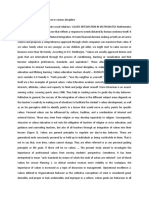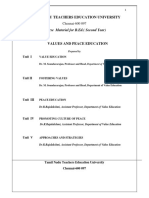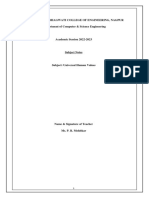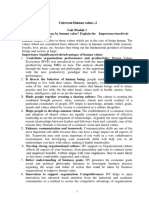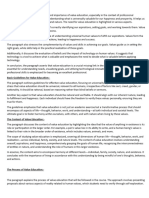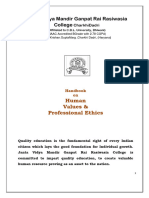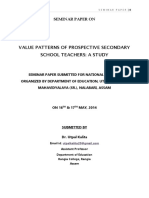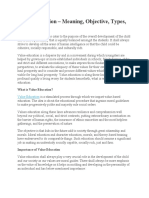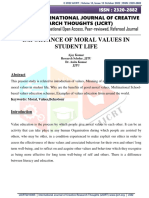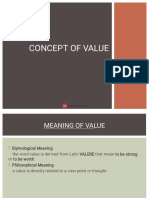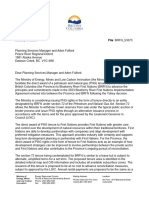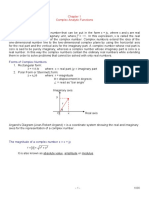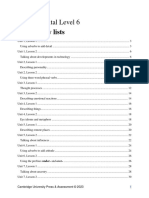Strategies For Developing Values Among Prospective Teachers - An Overview
Strategies For Developing Values Among Prospective Teachers - An Overview
Uploaded by
f10691122Copyright:
Available Formats
Strategies For Developing Values Among Prospective Teachers - An Overview
Strategies For Developing Values Among Prospective Teachers - An Overview
Uploaded by
f10691122Original Description:
Original Title
Copyright
Available Formats
Share this document
Did you find this document useful?
Is this content inappropriate?
Copyright:
Available Formats
Strategies For Developing Values Among Prospective Teachers - An Overview
Strategies For Developing Values Among Prospective Teachers - An Overview
Uploaded by
f10691122Copyright:
Available Formats
See discussions, stats, and author profiles for this publication at: https://www.researchgate.
net/publication/342097599
STRATEGIES FOR DEVELOPING VALUES AMONG PROSPECTIVE TEACHERS -
AN OVERVIEW
Conference Paper · March 2018
CITATIONS READS
0 3,153
2 authors:
Suresh. Krishnamoorthy Srinivasan Padmanaban
National Institute of Technology Pudu Central University of Tamil Nadu
84 PUBLICATIONS 55 CITATIONS 65 PUBLICATIONS 174 CITATIONS
SEE PROFILE SEE PROFILE
All content following this page was uploaded by Suresh. Krishnamoorthy on 11 June 2020.
The user has requested enhancement of the downloaded file.
National Seminar on Fine Tuning Students‟ Behaviour Through Values
STRATEGIES FOR DEVELOPING VALUES AMONG PROSPECTIVE
TEACHERS – AN OVERVIEW
Dr. K.Suresh & Dr. P. Srinivasan
Post Doctoral Fellow of ICSSR – New Delhi, Associate Professor, Department of Education,
School of Education & Training, Central University of Tamil Nadu, Thiruvarur, Tamilnadu. India
Abstract
Education and values are inseparable parts of our life. Generally, values cannot be taught through teaching
but it may transfer from the teacher or teacher educator. Though, it can be informally developed by telling the
value related stories to the students. Values are used to recognize and obey or follow the thing that good is
agreeable and bad is disagreeable. Values are embedded in education which changes the social desirable activities
to the learners. Teaching profession is mother of all other profession in such way the prospective teacher are the
pillar of the value development to the future students. It is the right time to teach value education and its
contribution to the behavior changes of the individual. Developing values among the prospective teacher and it may
reflect to their students through him/her activities. The author of this paper has concerned to create a picture
about the strategies to develop values among prospective teachers.
Keywords: Education, Values, Principles, Practical Activity and Social Activity
“A Value is a belief upon which on acts by preference”
- Allport (1950)
Introduction
Values are essential to the human being to interact with the environment in a sustainable way.
Aims are an end with in the individual but the values are products the individual. Values play a
significant role in the all individual’s life. Generally, Man created some notions for living and the
notions are called as values. Values are simply called as the human being wants to satisfy themselves
and other selves. this is was stressed by the word of Henderson, “Man acts to satisfy his wants,
anything which satisfies a human want becomes thereby a value”. Values are not separated from the
life but it embedded itself. According to Reid “Education is part of life, and nearly our question about
values and education are inseparable from larger question of values in life. Values are embodied in
educational practice”. Human being is a social dependent and so they must live with social created
notions that are values. Values are essential in our life to play our role in a defined and disciplined
manner. Keat says “Truth is Beauty and Beauty is Truth”. It is obviously right that values are essential
to play our role in proper manner otherwise it will like to drifting boat without anchor. This word
emphasizes the important of the values in our life and it makes our life standard and stable.
Need of Value Education
Value Education in an education strategy or methodology to provide training which maintains
the values of an individual through telling stories about the achievers. Value educational plays a
significant role in the individual life and it provides a way to live with social constructed notions. In
the year 1964-66, the Education Commission spotlighted on “education and national development”
and also identified the “absence of provision for education in social, moral and spiritual values” as
serious defects in the curriculum. It recommended that these values may be taught with the help of
the ethical teachings of great religions wherever possible. It was agreed by the Sri Prakasa Committee
and reported with the recommendation that direct moral instruction may be given in a one or two
periods a week should be set aside in the school time-table. The Government of India’s report on Value
Based Education also it is called as Chavan’s Committee Report (1999) submitted in both houses of
Parliament, provided impetus to resume work on value oriented education. The values are developed
through on the on the way of Implementing Value Education on teacher education. If the value
education is added to the teacher education the followings will be developed to the prospective
teachers.
BON SECOURS COLLEGE OF EDUCATION Page 41
ISBN: 978-93-87871-05-2
Crate good citizen
Adjustment with the environment and its modification
Character formation
Promotion of social efficiency
Healthy & Balanced personality
development of vocational efficiency
Proper utilization of leisure
National integration and National development
Fulfill the needs of the man
Different Types of Values
The different types of values are listed below.
According to the National Council of Teacher Education (NCTE) quoted the following as values
and they are Abstinence, Appreciation of cultural values of others, Anti-untouchabilty,
Citizenship, Consideration for others, Concern for others, Co –operation, Cleanliness,
Common cause, Common good, Courage, Courtesy, Democratic decision making, Devotion,
Dignity of the individual work, Dignity of manual work, Duty, Discipline, Endurance,
Equality, Friendship, Faithfulness, Fellow feeling, Freedom, Forward look, Good manners,
Gratitude, Gentlemanliness, Honesty, Helpfulness, Humanism, Hygienic living, Initiative,
Integrity, Justice, Kindness, Kindness to animals, Loyalty to duty, Leadership, National unity,
Obedience, Peace, Proper utilization of time, Punctuality, Patriotism, Purity, Quest for
knowledge, Resourcefulness, Regularity, Respect for others, Reverence of old age, Sincerity,
Simple living, Social justice, Self-discipline, Self-help, Self-respect, Self-confidence, Self
support, Self study, Self reliance, Self control, Self-restraint, Social service, Solidarity of
mankind, Sense of social responsibility, Sense of discrimination of good and bad, Socialism,
Sympathy, Secularism and respect for all religions, Spirit of enquiry, Team work, Team spirit,
Truthfulness, Tolerance, Universal truth, Universal love, and Value for national and civic
property.
N. Venkataiah summed those 84 values in three heads such as Social Values, Ethical Values and
Spiritual Values.
N.L. Gupta listed the values such as Righteouness, Self-Discipline, Fellow Feeling, Humanism,
Democratic Sense, and Non-Violence.
J.M. Kalra has listed five types of values and they are Essential Values, Personal Values, Social
Values, Cultural Values and Institutional Values.
Principles of Values
Educationists have propounded the following principle to determine the values and they are,
Principle of Hedonistic View of life: The values of the things is regarding to the power of
satisfying our need and it is should be a fact.
Principle of Perfection: If a thing considered the perfection of life for which a man in his/her
endeavors could be considered as value.
Principle of Utility of Theory: If anything has valuable utility, it is too considered value.
Principle of Order Theory: Anything which helps to organize society is considered to be a value.
Principle of Existence: A thing is helpful to identify the existence in the society and it may be
considered be a value.
Principle of Experimentation: A thing is obtained from a present and past experimentation for
reliable notions is called values.
Principle of Part and Whole Things: A thing must be part or wholly of the life standard notions
which may be called as values.
Page 42 BON SECOURS COLLEGE OF EDUCATION
National Seminar on Fine Tuning Students‟ Behaviour Through Values
Principle objective and Subjective: Values may be determined by the notions of individuals
circumstances and it should be high valid and based on the bases on the things.
Principle of Emotion: The values might reflect the individual emotions which are expressed by
his/her nature.
Strategies for Teaching Values
Method is nothing but a set of approach or ideas about the nature of learning which is
translated into the classroom. They are different type of strategies are available to develop values
among the students. Here some of the strategies are explained briefly and they are given below.
Classroom Learning Strategy: It is a basic strategy to develop values among the prospective
teachers by using the methods such as storytelling, biographies, Extracts from essay, article and New
papers, parable, proverbs, quotation, poem, anecdotes conflict.
Practical Activity Strategy: Participate the prospective teachers in practical activities like
School/classroom maintenance activity, social development activity, awareness activity like AIDS and
environmental degradation, eradicate the social evil activities like dowry, gender inequality and
alcoholism and it will used to develop their values lively.
Socialized Activity Strategy: It is a strategy that the values are realized through role playing
the social activities and they are given below,
Dramatization on values themes,
Role Playing and
Modeling.
The above activities may be reflecting in the theme of Gender Inequality, Women status on
society, and environmental pollutions.
Incidental Learning Strategy: It is an experience of an individual or a group in their life. It
consists in identifying the wrong or right action of an individual or group which is observed by an
individual.
Silent Sitting Strategy: It is a simple strategy to help in concentration and assimilation, clear
thinking, memory, health and vigours. It allows the individuals to sit quietly which is useful to
strengthening the inner being or self. Most of researchers have identified that silent sittings helps
improving self confidence, ability to get along with other, reducing destructive emotions, calmness
and increasing inspiration.
Visual Experience Strategy: Values may be taught through showing pictures such as symbols,
drawing, pictures, posters, cartoons, charts, graphs and it will powerful for communication of
attitudes as well as values.
Story Telling Strategy: It is a best strategy to inculcate the value based message to the
prospective teachers. Stories about lives of a man of eminence which will give messages about the
values they are embodied. Religion stories and parables figures highlighting the ethical values to the
students.
Anecdotes Strategy: It is a like a story and it is account of real life experiences which portray
of genuine human feelings and expressions. It is a user friendly method to communicate the values to
the prospective teachers. They are inspired and they taught the individual that how they acted of
faced the different life situation drawn from home, school and socials.
Group Singing Strategy: It is an important strategy to remain the consciousness for long time.
Here song selection is so important and it could be chosen to reflect the good thoughts, love of nature,
feeling of sacrifice, cultural and heritage. Group singing creates the unity, discipline and co-operation
of the individual prospective teacher.
Group Activity Strategy: It provides an opportunity for learning many values. By working in
groups, the individual prospective teacher learn the values of each others sincere efforts, joy of doing
one’s best for the good of whole group.
BON SECOURS COLLEGE OF EDUCATION Page 43
ISBN: 978-93-87871-05-2
Conclusion
Teacher education is an education system to produce good teacher for future development.
The prospective teachers are the pillar to mould the students in a desirable and profitable way also
seeding the values to the students through their teaching. The inculcation of value education may
develop the values on prospective teacher formally and we may develop values to the students
informally by the prospective teachers. Prospective teachers are great tool to develop values among
for future generation students and they must know what are the values are used to live properly.
References
1. Ainscow, M. (1997). Value Education. Retrieved, Feb 13, 2018 from
http://en.wikipedia.org/wiki/Value Education.
2. Bhatt, Dipti. P. (2013). Teacher education. New Delhi: APH Publishing Corporation.
3. Chandra, S.P. & Sharma, Rajendra. K. (2012). Sociology of education. New Delhi: Atlantic
Publishers and Distributors Pvt. Limited.
4. Pathak, R.P.(2013). Education in emerging India. New Delhi: Atlantic Publishers and Distributors
Pvt. Limited.
5. Singh, Y.K & Nath, Ruchika. (2014). Teacher education. New Delhi: APH Publishing Corporation.
6. Value Education Meaning. Retrieve, Feb 05, 2018, http://www.chengzhi.net/english/.
7. Value Education Meaning. Retrieved, Feb 13, 2018 from http://www.virtual-
college.co.uk/elearning/Value Education.aspx.
8. Allport (1950). Definition of Values. Retrieved, Feb 13, 2018 from http :// www. dlsud. edu.
ph/COEd /REED/ assets/ docs/ ppt/Dr.%20Fides-del-Castillo-Approaches-and-Strategies-in-
Teaching-Values.pdf
Page 44 BON SECOURS COLLEGE OF EDUCATION
View publication stats
You might also like
- ValedDocument5 pagesValedJackNo ratings yet
- Importance of Values Integration in Various DisciplineDocument7 pagesImportance of Values Integration in Various Disciplinemaseille bayumbonNo ratings yet
- Value Education in Educational Institutions and Role of Teachers in Promoting The ConceptDocument11 pagesValue Education in Educational Institutions and Role of Teachers in Promoting The ConceptRaj Kumar JoshiNo ratings yet
- A Study of The Value Among Prospective Teachers (B.Ed Students)Document6 pagesA Study of The Value Among Prospective Teachers (B.Ed Students)bimlasharmaNo ratings yet
- HV Unit 1Document16 pagesHV Unit 1trustme77No ratings yet
- Higher Education 08 - Daily Class Notes - Mission JRF June 2024Document9 pagesHigher Education 08 - Daily Class Notes - Mission JRF June 2024Rohamat MandalNo ratings yet
- Grabsum School Inc.: Values EducationDocument39 pagesGrabsum School Inc.: Values EducationZeny HernandezNo ratings yet
- Tamil Nadu Teachers Education University: Course Material For B.Ed. (Second Year)Document96 pagesTamil Nadu Teachers Education University: Course Material For B.Ed. (Second Year)CaladhielNo ratings yet
- Unit I - Introduction To Value EducationDocument15 pagesUnit I - Introduction To Value Educationmayukhabhi100% (1)
- UHV Unit 4,5,6Document84 pagesUHV Unit 4,5,6Amit PachareNo ratings yet
- Assignment 505Document15 pagesAssignment 505Waqas Malik100% (1)
- Unit I Introduction To Value Education PDFDocument19 pagesUnit I Introduction To Value Education PDFMubasshir Shaikh100% (5)
- 5 Ijesraug20185Document10 pages5 Ijesraug20185TJPRC PublicationsNo ratings yet
- Indian Journal of Adult EducationDocument212 pagesIndian Journal of Adult EducationAnnPSWNo ratings yet
- Value Based EducationDocument15 pagesValue Based EducationNayankumar KJ lionNo ratings yet
- Teacher's Role in Value Education and Educational Management of An InstitutionsDocument8 pagesTeacher's Role in Value Education and Educational Management of An Institutionsbmerf indiaNo ratings yet
- Module 5Document12 pagesModule 5seemakatariaNo ratings yet
- Sociological Persepective of EducationDocument23 pagesSociological Persepective of EducationLeisha VishwakarmaNo ratings yet
- Human Values Unit I Introduction2Document14 pagesHuman Values Unit I Introduction2amit100% (3)
- Unit I - Introduction To Value EducationDocument77 pagesUnit I - Introduction To Value EducationHarpreet Singh Burmi100% (1)
- UHV All UnitsDocument105 pagesUHV All Unitsvenkatesh.j545No ratings yet
- Chapter OneDocument2 pagesChapter Onekiyemi8123No ratings yet
- Project On Human Values and EthicsDocument14 pagesProject On Human Values and EthicsRaj MalhotraNo ratings yet
- UHV All Units_R 23Document96 pagesUHV All Units_R 23zyt2473No ratings yet
- "A Comparative Study On The Academic Achievement of Secondary Level Students of Joint and Nuclear Families in Relation To Their Values and AdjustmentDocument10 pages"A Comparative Study On The Academic Achievement of Secondary Level Students of Joint and Nuclear Families in Relation To Their Values and Adjustmentstarlion4uNo ratings yet
- Value CBCSDocument5 pagesValue CBCSprincikanabar2002No ratings yet
- Values in Higher Education: Need and Importance: Dr. Anuradha Sindhwani & Dr. Rajeev KumarDocument6 pagesValues in Higher Education: Need and Importance: Dr. Anuradha Sindhwani & Dr. Rajeev Kumarvk sarangdevotNo ratings yet
- Impactof Value Educationin Personal Behaviourof Students ACase Studyof NepalDocument9 pagesImpactof Value Educationin Personal Behaviourof Students ACase Studyof Nepalprince vermaNo ratings yet
- Group 1 Beed1 A2 Ved111Document20 pagesGroup 1 Beed1 A2 Ved111Lovely Quevedo ʚĩɞNo ratings yet
- 3 Ketan Laxman KambleDocument10 pages3 Ketan Laxman KambleINTERNATIONAL JOURNAL FOR EDUCATIONAL RESEARCH STUDIESNo ratings yet
- Unit 1Document27 pagesUnit 1Aditya Sharma100% (1)
- Value EducationDocument52 pagesValue Educationsakshi Anand0% (1)
- Uhv & Pe Unit 1 & 2Document20 pagesUhv & Pe Unit 1 & 2JAGRITI AWASTHINo ratings yet
- GMRCDocument79 pagesGMRCMarivelNo ratings yet
- Values 1Document54 pagesValues 1Vaibhav Singh ChoudharyNo ratings yet
- Value Education Unit OneDocument14 pagesValue Education Unit OnereorffggjhgNo ratings yet
- 202Document4 pages202Dr_MaheshKNo ratings yet
- RVE-401-Introduction To Value EducationDocument17 pagesRVE-401-Introduction To Value EducationNeha PalNo ratings yet
- Role of Teachers in Inculcating Values Among Students c1256Document6 pagesRole of Teachers in Inculcating Values Among Students c1256Team BEENo ratings yet
- Value Inculcation Among Future TeachersDocument3 pagesValue Inculcation Among Future TeachersAnonymous CwJeBCAXpNo ratings yet
- 17 HVPE PolicyDocument15 pages17 HVPE PolicyCrissNo ratings yet
- Code of ConductDocument18 pagesCode of Conductchetan.kNo ratings yet
- Value EducationDocument13 pagesValue EducationUtpal Kalita0% (1)
- Value Education Unit 1Document18 pagesValue Education Unit 1Falak Falak fatima67% (3)
- Human ValuesDocument5 pagesHuman ValuesPRO-STERNo ratings yet
- 21.hum-Role of The Teacher in Inculcating Moral Values Among High School PupilsDocument4 pages21.hum-Role of The Teacher in Inculcating Moral Values Among High School PupilsImpact JournalsNo ratings yet
- Moral ValuesDocument7 pagesMoral Valuesjasmeet6733No ratings yet
- Management of School Education: Dr. Manjula, H.S. T. ManichanderDocument42 pagesManagement of School Education: Dr. Manjula, H.S. T. ManichanderrubabshaikhNo ratings yet
- C. Concept of ValueDocument18 pagesC. Concept of Valuejhaymagtibay0690No ratings yet
- Value EducationDocument35 pagesValue Educationmayurwaykar1981No ratings yet
- Necessity of Value-Oriented Education in India: Article Shared byDocument9 pagesNecessity of Value-Oriented Education in India: Article Shared byRaish QURESHINo ratings yet
- Value EducationDocument16 pagesValue EducationTamarindosoNo ratings yet
- Present Status of Moral Education in Schools: A Descriptive StudyDocument5 pagesPresent Status of Moral Education in Schools: A Descriptive StudyAmanjyoti KaurNo ratings yet
- Ilovepdf MergedDocument245 pagesIlovepdf Mergeddhruvpurohit124No ratings yet
- UHV MergedPDFDocument358 pagesUHV MergedPDFazlanahmed211No ratings yet
- Unit 1 UhvpeDocument20 pagesUnit 1 UhvpekeshavamstudioNo ratings yet
- Hm-Ee401Document9 pagesHm-Ee401Anushree OraonNo ratings yet
- Value EducationDocument82 pagesValue EducationEhsaas CinemaNo ratings yet
- Reflective Practice of Multi-Unicultural School LeadersFrom EverandReflective Practice of Multi-Unicultural School LeadersNo ratings yet
- The Dharmic Leader: Leadership Anchored in Hindu and Buddhist Secular Core ValuesFrom EverandThe Dharmic Leader: Leadership Anchored in Hindu and Buddhist Secular Core ValuesNo ratings yet
- BATANAI HIGH SCHOOL FORM 4 MATHS CALA 2021 Comp A 2022Document2 pagesBATANAI HIGH SCHOOL FORM 4 MATHS CALA 2021 Comp A 2022TAKUNo ratings yet
- Water Supply Management Policy in Nigeria: Challenges in The Wetland Area of Niger DeltaDocument21 pagesWater Supply Management Policy in Nigeria: Challenges in The Wetland Area of Niger DeltamatijciogeraldineNo ratings yet
- Free Books Receiving Form D 3 NewDocument1 pageFree Books Receiving Form D 3 Newshahroz AhmadNo ratings yet
- Air Force Stress Anaysis ManualDocument555 pagesAir Force Stress Anaysis ManualmssharmaNo ratings yet
- Managerial Economics: Introduction, Nature, Scope & SignificanceDocument13 pagesManagerial Economics: Introduction, Nature, Scope & SignificanceRamya NairNo ratings yet
- Narrative Accomplishment Report Be23Document2 pagesNarrative Accomplishment Report Be23Nick P. DimatulacNo ratings yet
- Log Periodic AntennaDocument15 pagesLog Periodic Antennarushi dudhaniNo ratings yet
- Correspondence - Ministry of Energy, Mines Letter Re Direct Award of A Petroleum and Natural Gas TenureDocument7 pagesCorrespondence - Ministry of Energy, Mines Letter Re Direct Award of A Petroleum and Natural Gas TenureTom SummerNo ratings yet
- Complex Analytic FunctionsDocument8 pagesComplex Analytic FunctionsMelindaNo ratings yet
- Maintenance of TransformerDocument8 pagesMaintenance of TransformeranilsinghteslaNo ratings yet
- Assignment TT - 4Document11 pagesAssignment TT - 4BISHAL DAS Summer 22No ratings yet
- Manual Conductometru HI 99300 Si HI 99301 Engl.Document2 pagesManual Conductometru HI 99300 Si HI 99301 Engl.marius vasileNo ratings yet
- Evolve Digital Level 6 Vocabulary ListsDocument51 pagesEvolve Digital Level 6 Vocabulary Listsvanessalondomo1929No ratings yet
- History of Kinematics - Inception of Modern KinematicsDocument137 pagesHistory of Kinematics - Inception of Modern KinematicsMartín FigueroaNo ratings yet
- Peace and Values Education - Grade 7Document2 pagesPeace and Values Education - Grade 7Eddie Lumaras Jr.94% (17)
- Worksheet On H.C.F. and L.C.M. H.C.F. by Long Division Method AnsDocument1 pageWorksheet On H.C.F. and L.C.M. H.C.F. by Long Division Method AnsNayasha VaishNo ratings yet
- PPE PolicyDocument3 pagesPPE PolicyTolbert OkiringNo ratings yet
- Test-Taking StrategiesDocument2 pagesTest-Taking StrategiesGenius WarriorNo ratings yet
- The Training of Meat Inspection in BotswanaDocument30 pagesThe Training of Meat Inspection in Botswanafikirte lemmaNo ratings yet
- What Literature Review MeansDocument7 pagesWhat Literature Review Meansc5nah867100% (1)
- Causes and Consequences of Occupational Fatigue: Meta-Analysis and Systems ModelDocument13 pagesCauses and Consequences of Occupational Fatigue: Meta-Analysis and Systems ModelLinna SriwaningsiNo ratings yet
- Module 1 PDFDocument19 pagesModule 1 PDFSinamar Laroya-RefuerzoNo ratings yet
- Algebra Worksheets - Expanding Brackets - Year 8 Math Worksheets - Vivax Solutions2Document1 pageAlgebra Worksheets - Expanding Brackets - Year 8 Math Worksheets - Vivax Solutions2Ammar RizwanNo ratings yet
- Irm1501 Assignment 1Document5 pagesIrm1501 Assignment 1marketingmacbethNo ratings yet
- Introduction To Agada TantraDocument4 pagesIntroduction To Agada TantraGovind sahaiNo ratings yet
- Belemed Icct Final DemoDocument3 pagesBelemed Icct Final DemoLiveeNo ratings yet
- P 5 XNMDocument25 pagesP 5 XNMNurul Izzati SaharuddinNo ratings yet
- RSM Two Year PDFDocument6 pagesRSM Two Year PDFmiliNo ratings yet
- Swanage CourseworkDocument8 pagesSwanage Courseworkafjwrcqmzuxzxg100% (2)
- Erik Homburger EriksonDocument23 pagesErik Homburger EriksonErickson GarciaNo ratings yet

